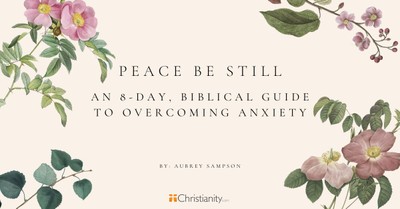'The Nuclear Family Was a Mistake': My Response to an Article of Seismic Significance
David Brooks is one of the best-known public intellectuals in America. A longtime columnist for the New York Times and a contributing writer at the Atlantic, he is also the author of several best-selling books. I have found him gracious and humble in person and have followed his writing with appreciation over the years.
However, I was more than surprised by the headline of his latest Atlantic essay: “The Nuclear Family Was a Mistake.” His article is receiving so much attention this week that I’ve chosen to summarize it and then respond to it biblically. Given the significance of this issue, today’s Daily Article is a little longer than usual.
From farms to factories
Brooks describes what he calls “the story of the family, once a dense cluster of many siblings and extended kin, fragmenting into ever smaller and more fragile forms. The initial result of that fragmentation, the nuclear family, didn’t seem so bad. But then, because the nuclear family is so brittle, the fragmentation continued. In many sectors of society, nuclear families fragmented into single-parent families, single-parent families into chaotic families or no families.”
He notes that in the year 1800, three-quarters of American workers were farmers with large families living together. Until 1850, roughly three-quarters of Americans older than sixty-five lived with their kids and grandkids. Nuclear families (a husband and wife living with their children) were surrounded by extended or corporate families.
Extended families, as Brooks notes, provide resilience when facing hardship and help raise children together. But when factories opened in big US cities in the late nineteenth and early twentieth centuries, “young men and women left their extended families to chase the American dream.” The families they started were nuclear. By 1960, 77.5 percent of all children were living with their two married parents and apart from their extended family.
There are more American homes with pets than kids
From 1950 to 1965, divorce rates dropped, fertility rates rose, and the nuclear family seemed to thrive. According to Brooks, “when we think of the American family, many of us still revert to this ideal.”
However, only one-third of American individuals live in this kind of family today. Brooks claims that the “1950–65 window was not normal. It was a freakish historical moment when all of society conspired, wittingly and not, to obscure the essential fragility of the nuclear family.”
Brooks cites these statistics: from 1970 to 2012, the share of households consisting of married couples with kids has fallen by half. Just 13 percent of households were single-person families in 1960; in 2018, that figure was 28 percent.
In 1960, 72 percent of American adults were married; in 2017, nearly half were single. More than four-fifths of American adults in a 2019 survey said that getting married was not essential to living a fulfilling life. In 2004, 33 percent of Americans ages eighteen to thirty-four were living without a romantic partner; by 2018, that number was up to 51 percent.
Families have gotten smaller as well: the general American birth rate is half of what it was in 1960. Today, there are more American homes with pets than with kids.
Brooks also notes that “African Americans have suffered disproportionately in the era of the detached nuclear family.” Nearly half of black families are led by an unmarried single woman, compared with less than one-sixth of white families. Two-thirds of African American children lived in single-parent families in 2018, compared with a quarter of white children.
Children are especially affected by the breakdown of the nuclear family. In 1960, roughly 5 percent of children were born to unmarried women; now about 40 percent are. In 1960, 11 percent of children lived apart from their fathers; in 2010, 27 percent did. Only about half of American children will spend their childhood with both biological parents.
When we drive our car into the ditch
Here’s the foundational part of the essay: “When hyper-individualism kicked into gear in the 1960s, people experimented with new ways of living that embraced individualistic values. Today we are crawling out from the wreckage of that hyper-individualism—which left many families detached and unsupported—and people are experimenting with more connected ways of living, with new shapes and varieties of extended families.”
Brooks asserts: “The blunt fact is that the nuclear family has been crumbling in slow motion for decades, and many of our other problems—with education, mental health, addiction, the quality of the labor force—stem from that crumbling.” He believes that “Americans are hungering to live in extended and forged families, in ways that are new and ancient at the same time.”
Brooks is right to focus on the 1960s as the decade when the fragmentation of nuclear families began. But he does not explain why such “hyper-individualism” began then.
The answer is a cultural movement called postmodernism. This worldview claims that our minds subjectively interpret our subjective experiences, resulting in subjective “truth.” “You have no right to force your beliefs on me” is the mantra of our day.
This movement began in the 1960s for reasons too complicated to explain here (for much more, see my website article, “Shaking the Foundations: The Shift in Scriptural Authority in the Postmodern World“). It made the Bible a diary of religious opinion and biblical morality “your truth.”
Of course, to claim that there is no such thing as absolute truth is to make an absolute truth claim. And to reject biblical morality regarding sex (to be experienced only within marriage) and marriage (a lifelong covenant between a man and a woman) is to suffer the consequences (cf. Matthew 19:4-6).
When we drive our car off the road into the ditch, ignoring the signs along the way, the damage that results is not the fault of the carmaker but the driver.
“Forged families” and the family of God
Let’s close with some good news.
Brooks reports that family trends may be changing. Economic pressures following the 2008 recession have pushed Americans toward greater reliance on family. Today, 20 percent of Americans live in multigenerational homes, up from 12 percent in 1980. More young adults are moving back home, as are seniors. Communal living, where people share a kitchen and help with parenting, is also growing in popularity.
Brooks points to an endeavor he started two years ago called Weave: The Social Fabric Project. Weave “exists to support and draw attention to people and organizations around the country who are building community.” He cites organizations that bring traumatized veterans into extended-family settings and nursing homes that house preschoolers so seniors and young children can go through life together. Brooks became part of one such “forged family” in which twenty-five children gathered with several adults for dinner every Thursday night.
Our culture’s hunger for authentic family is an invitation to the family of God. Your church and mine should be a loving community into which anyone is welcome and which offers the resilience and shared values extended families once provided.
David Brooks’ article reveals the problem. Now it’s our turn to offer the solution.
The more our culture runs from God, the more we run into him. The darker the room, the more powerful the light (cf. Psalm 43:3).
Who will see the light of God’s love in your heart and home today?
Publication date: February 13, 2020
Photo courtesy: ©Getty Images/Monkey Business Images
Jim Denison, PhD, is a cultural theologian and the founder and CEO of Denison Ministries. Denison Ministries includes DenisonForum.org, First15.org, ChristianParenting.org, and FoundationsWithJanet.org. Jim speaks biblically into significant cultural issues at Denison Forum. He is the chief author of The Daily Article and has written more than 30 books, including The Coming Tsunami, the Biblical Insight to Tough Questions series, and The Fifth Great Awakening.
The views expressed in this commentary do not necessarily reflect those of CrosswalkHeadlines.
For more from the Denison Forum, please visit www.denisonforum.org.
The Daily Article Podcast is Here!


















